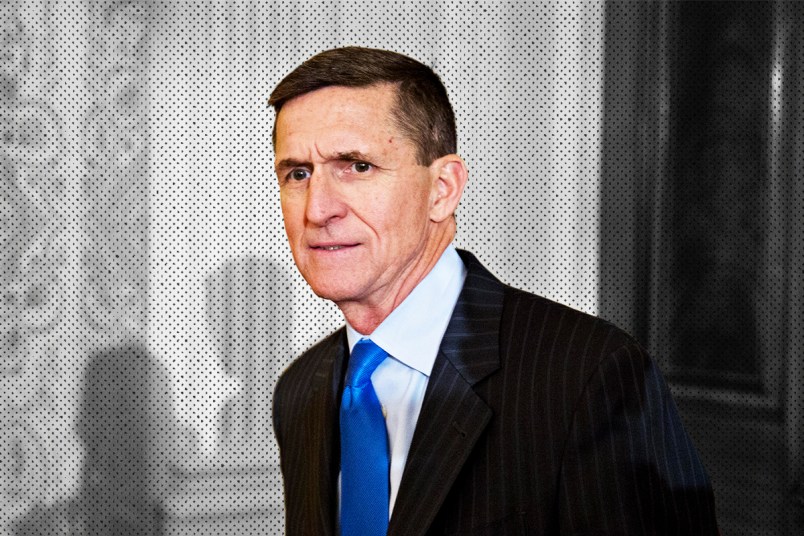The Justice Department defended its decision to drop charges against Michael Flynn at the D.C. Circuit Court of Appeals on Friday, arguing broadly that any scrutiny of its decision would wreak havoc on the department.
U.S. Deputy Solicitor General Jeff Wall cast the argument in stark constitutional terms, suggesting that the judge in the Flynn case had already damaged both the Justice Department and the judiciary by subjecting the DOJ’s decision to move to drop charges against Flynn to public examination.
“This has already become, and I think is only becoming more of, a public spectacle,” Wall said of actions by U.S. District Judge Emmet Sullivan for the District of Columbia.
Wall repeatedly expressed worry at the idea that Sullivan would attempt to conduct some kind of discovery at the DOJ through affidavits or declarations. Sullivan has yet to suggest that he would do so, and has yet to rule on the DOJ’s motion to dismiss.
“You’ll have a proceeding forcing us to explain ourselves,” Wall said. “The district court has left itself room not just for documents of that kind or witnesses; that is going to intrude on our deliberative process.”
He added that the “spectacle” would end up “impugning the motives of the Attorney General of the United States.” Wall described the amicus brief of John Gleeson — the outside attorney Sullivan appointed to oppose the DOJ request to dismiss the case — as a “polemic” alleging “gross misconduct.”
Broadly, though, Wall focused on the idea that court proceedings were not the forum for handling allegations of corruption against the Justice Department in making prosecutorial decisions. That, he maintained, is a political question to be handled away from the courts.
The Flynn case is just one example of what has become a pattern of DOJ actions that appear to have been bent to the whims of President Trump. Wall’s claims are also in line with the aggressive arguments the Justice Department has made in supporting Trump in cases where Trump is resisting oversight. The DOJ has argued that those disputes should be resolved by the political process, rather than settled by courts.
Randall Samborn, who served as a spokesperson for the special counsel investigation into the Valerie Plame leak, told TPM that Wall’s arguments were “frightening” because “absent any judicial inquiry, it may be impossible to determine whether there was any misconduct, bad faith, or other improper motive, and courts must maintain their inherent authority over cases and the conduct of parties before them.”
However, other legal experts acknowledged that on the merits, whether a judge has the ability to second guess the Justice Department’s reasons for seeking the dismissal of a case is a “harder” question than the one technically before the appeals court Friday: whether it needs to now intervene in Sullivan’s handling of the Flynn matter.
“It is a dangerous area, for the courts to begin inquiring the reasons behind a prosecutorial decision,” Barbara McQuade, a former U.S. Attorney, told TPM. She said she had worked on cases where there was classified evidence motivating decisions to bring or not bring a case.
But, she added, the DOJ had already put into the public record evidence that its conduct was “irregular” (courts typically give the federal government the presumption of regularity) and that separated this case from the Supreme Court decision that weighed most heavily in Flynn and the DOJ’s favor.
“There’s important language in that case [U.S. vs. Fokker Services] that says in the absence of evidence to the contrary we should presume regularity,” McQuade, who now teaches at Michigan Law, said. “There is a lot of evidence to the contrary in this case.”
Samborn meanwhile argued that “It would be different if Flynn was never charged.”
But because the case had progressed past the guilty plea, the judge should have the authority to “to independently determine if there is a reasonable, good faith basis” for the prosecution to now “sweep the case away,” Samborn said in an email to TPM.
“And if the Government’s motives are pure, it should have no hesitation about confessing error or disclosing its reasons, unless there is something nefarious to hide,” Samborn said. “The government’s claim of unquestionable authority only lends suspicion to its motives.”







The way a wooden stake or the light of day “wreaks havoc“ on a vampire, I suppose.
"He added that the “spectacle” would end up impugning the motives of the Attorney General of the United States.”
Well, yeah.
…but is there a memo?
Farewell, Rule of Law, it was good while it lasted.
I, for one, love the fact that the lede has “Corrupt” appearing right along with “DOJ”.
Where it belongs…